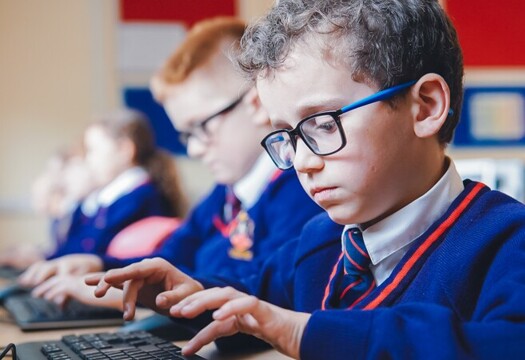- Home
- Curriculum
- By Subjects
- Computing
Computing
Intent
Computing is an ever changing subject and we are developing our provision all the time, adding both hardware and software to our systems. Our aim is to develop thinkers of the future through a modern, ambitious and relevant education in computing. We want to equip pupils to use computational thinking and creativity that will enable them to become active participants in the digital world. It is important to us that the children understand how to use the ever-changing technology to express themselves, as tools for learning and as a means to drive their generation forward into the future. We want children to develop as respectful, responsible and confident users of technology, aware of measures that can be taken to keep themselves and others safe online.
Our aim is to provide a computing curriculum that is designed to balance acquiring a broad and deep knowledge, alongside creative opportunities to apply skills in various digital contexts. Beyond teaching computing discreetly, we will give pupils the opportunity to apply and develop what they have learnt across wider learning in the curriculum. We hope that by the end of Upper Key Stage 2, children have the independence and confidence to choose the best tool to fulfil the task and challenges set by teachers.
Implementation
Our scheme of work for Computing is adapted from the ‘Teach Computing’ Curriculum and covers all aspects of the National Curriculum. This scheme was chosen as it has been created by subject experts and based on the latest pedagogical research. It provides an innovative progression framework where computing content (concepts, knowledge, skills and objectives) has been organised into interconnected units.
Computing has deep links with mathematics, science and design and technology and provides insights into both natural and artificial systems. The core of computing is computer science, in which pupils are taught the principles of information and computation, how digital systems work and how to put this knowledge to use through programming. Building on this knowledge and understanding, pupils are equipped to use information technology to create programs, systems and a range of content. Computing also ensures that pupils become digitally literate – able to use and express themselves and develop their ideas through information and communication technology – at a level suitable for the future workplace and as active participants in a digital world.
The national curriculum for computing aims to ensure all pupils:
-
can understand and apply the fundamental principles and concepts of computer science, including abstraction, logic, algorithms and data representation (Computer science)
-
can analyse problems in computational terms, and have repeated practical experience of writing computer programs in order to solve such problems (Computer science)
-
can evaluate and apply information technology, including new or unfamiliar technologies, analytically to solve problems (Information technology) are responsible, competent, confident and creative users of information and communication technology. (Digital literacy)
